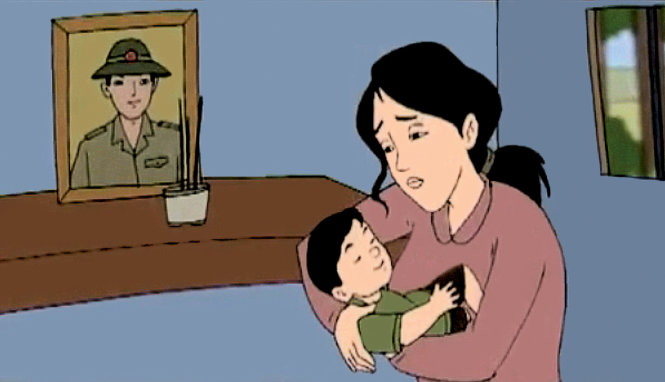Among them, the most outstanding was the clip “Childhood Lesson” from the program “Gifts of Life.”
 |
| A still image from the clip “Childhood Lesson”, broadcast by the “Gifts of Life” program of Vietnam Television. |
When will adults stop letting the pressure of grades and achievements overshadow the simple, genuine lessons of literature — lessons that help children be truthful in both their words and actions in everyday life?
The story in the clip goes like this:
The teacher gave the class a test with the topic “Describe your father’s night work.”
A boy proudly told his father that he got the highest score — an 8 — and explained why, even though his classmate Sơn (the main character in the story), who was the best student in literature, received a zero.
“Since you don’t work at night, I imagined you as our neighbor who often works the night shift, Dad.”
“Sơn left it blank because he doesn’t have a father and didn’t know what to write. He’s been an orphan since birth. His father died in the line of duty, and his mother has raised him alone ever since.”
After hearing the story, the father was moved and said, “Your friend is truly admirable.”
But the son disagreed, saying, “If it were me, I would describe someone else’s father — I would never accept a zero.”
“You’re mistaken. Your friend Sơn got a zero, and that’s a painful thing for him. But for you, it’s a lesson — a lesson about honesty. In this case, creativity means fabrication. Between lines of made-up words and a blank page, your friend Sơn made the right choice. He turned in an honest, blank sheet of paper.”
After the students finished watching the video, I asked them: “If you hadn’t seen this video, and were in the same situation as Sơn, would you have written your essay like he did?”
The whole class said no — they would have written something untrue, like the student who got an 8.
I called on a few students and asked why they would do that. They all said they were afraid of getting a low grade and would rather lie in their writing to earn a higher score.
Then I asked another question: “Now that you’ve watched this video and learned a valuable lesson about honesty, would any of you dare to accept a zero and hand in a blank paper?”
I gave the students time to think and answer honestly.
Although my students know me well — my outlook on life and the message from the video — only a few of them said they would be willing to submit a blank paper.
That shows that from the moment they enter primary school, adults have already taught children to write dishonestly and make things up just to get high grades. Because of the pressure of grades, they dare not hand in a blank paper to preserve their honesty or accept a zero.
Since then, I have made it a habit to collect meaningful and educational videos from real life to help instill in my students good values and a sense of integrity.
When will “literature truly be anthropology,” as it is meant to be?
When will adults stop letting the pressure of grades and achievements drive them to teach children only the pursuit of marks — instead of the simple, genuine beauty of literature that helps them live truthfully, in both words and actions?
Indeed, it is difficult to achieve that as long as we cling to the obsession with achievements, and keep valuing flowery but hollow, fabricated pieces of writing.
I truly hope that from primary school onward (and at every level of education), when the school gates open, the magical world that awaits the children will be one built on genuine values.
Those values must begin with the adults.
| Do parents truly understand the feelings of their children? In the final semester exam of the past school year, X Primary School gave the following writing prompt to its fifth-grade students: The topic was very close to the students’ everyday lives, so many of them wrote their essays with genuine feelings and sincerity. What surprised the teachers most while grading the essays was how openly the students expressed their thoughts and feelings. Many things that adults often dismiss with the phrase “What do children know?” were revealed in their writings as heartfelt confessions poured out onto the page. In her essay about her father, student A. wrote: Writing about her mother, student B. shared: Reading such natural, heartfelt sentences, the teachers couldn’t help but both laugh and cry. They were deeply moved when reading what student C. wrote about her grandmother: And how endearing were the words student D. wrote about her sister: Reading the students’ heartfelt thoughts, the teachers felt their pupils’ minds were so pure and innocent, and their affection for their loved ones so tender and sincere. All the teachers agreed to meet with these students privately, gently helping them ease their worries and sorrows so they could feel at peace, focus on their studies, and continue to enjoy their carefree, joyful childhood as they should. Some essays left the teachers wondering whether they should let the parents read them or not. Without understanding and empathy, some parents might think their children were exposing the family’s private troubles — or even believe that the teachers were being “nosy,” interfering in family matters through the innocent writings of their students. |

